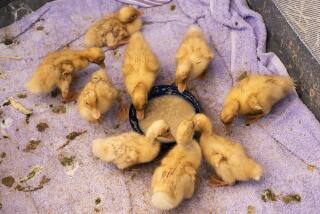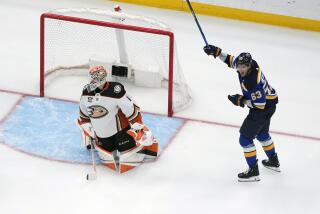Wisequacks Aside, Bob Duck Lives His Name : Webfooted Racers’ Feats Reward Eponymous Hobbyist
- Share via
BOSQUE FARMS, N. M. — Robert Duck’s stable of championship racing fowl is home to Michael DuQuackis and Here’s George, among others.
Although neither Michael nor George was a winner in this year’s Great American Duck Race in Deming, Duck’s entries often dominate the Olympics of waddling.
And don’t start coining puns about his name. He’s heard them all. “Most of them are too fowl to repeat,” he says.
Feathers fly when Duck begins the training routine at his farm here.
‘Go, go, go!” he yells, as he chases a quacking mallard down a 24-foot-long ramp.
“Eight-nine!” his wife, Kathy, shouts, punching the stopwatch as Oliver South rushes past the 16-foot mark.
Timing Oliver South
Oliver South is one of the most celebrated of the Ducks’ ducks. He won the Great American last year, covering the 16-foot course at Deming Duck Downs in a record 1.23 seconds.
This year, another of Duck’s flock, Pride of the 62nd Army Band, won the race in 1.08 seconds, shattering Oliver South’s record. Duck’s 28 entries took six of eight places in the finals and all three top positions in the last race.
Duck’s ducks have won in 7 of the 8 years they have competed in the event, held in late August.
Duck racing has flourished in Deming since it began as a summer afternoon social gathering in 1980. This year, several hundred ducks from several states competed, cheered on by several thousand spectators.
“The original idea was to get maybe 50 ducks out to the park--maybe 150 people or so--have a barbecue, a good time and go home,” Duck said. “Then the national news media picked it up, and it has absolutely gone bonkers since.”
He said several trainers now will show up to enter 20 or more ducks at $10 each. Rivalries have blossomed, with everyone else shooting for Duck.
Well Developed Rivalries
“We’d love to beat him. There’s nothing friendly about it,” competitor Everett Hassman of Deming said. “I’d give anything to beat him.’
Duck, 38, said he first entered the race because of his name, then became serious about it because he could win money. In addition to his income as president of an Albuquerque jewelry wholesaler, he has earned more than $30,000 racing ducks, he said. The hobby has earned him $5,450 this year alone.
“But once you’re on top of the hill, and especially when your name is Duck and you’re winning duck races, it’s more than the money,” he said. “It’s the fun of the event.”
Duck has appeared on NBC-TV’s “The Tonight Show” and has been featured in several national-circulation magazines. His office walls are lined with framed copies of newspaper articles about his triumphs.
Duck says he is not just a lucky Duck. The secret to winning is trying different training techniques.
Tricks of Training
“Duck racing is such a new sport, it doesn’t have hundreds of years of history like horse racing, (with) tried and proven techniques of training. You just have to be very innovative,” he said.
One year, he tried filling socks with sand and gravel and tying them to his racers’ legs to strengthen the muscles. He abandoned the idea, however, because the socks kept getting caught on things.
The next year, he attached weights to the ducks’ legs using Velcro strips, but the ducks just pulled them off. He tried a treadmill one year, but it scraped the pads of the ducks’ feet.
“Since then, I have developed some training methods for building up the muscles, which I am going to stop short of revealing,” he said.
He said it is not true, however, that he will do anything for a fast duck. “I would never do anything illegal. I would never do anything to hurt the duck.”
He starts the training 6 weeks before race day and works with the ducks every evening.
Routine Is Key
“Every day they’re run through that track, so, after 6 weeks of this, they know what it’s all about when they get down there,” he said.
His routine is based on the simple premise that ducks don’t like to be held. He shakes each duck a bit before each run, to ruffle the feathers and give it incentive for a fast getaway.
“They know if they run fast enough, I won’t pick them up and make them do it again,” he said.
The Ducks keep a computer spread sheet on each racer’s performance in training to help them decide which of the 25 racing ducks are potential winners.
Before each race, Duck whispers to each entry words of encouragement that would make Knute Rockne proud: “Be a winner or be dinner!”
He tells people that he feeds his ducks green chili before a race and ice cream afterward, but he concedes that their main diet is a grain mixture that he is continually modifying.
Background With Dogs
Duck was once a champion dog-obedience trainer, and he said that his background with dogs has helped him train ducks.
“I have found that if you have a knowledge of animal behavior it will transfer from one animal to another. So, if you know how to train a dog, you have a head start on training ducks,” he said.
Duck’s love of animals is evident on his farm near a waterfowl refuge on the Rio Grande, about 15 miles south of Albuquerque. In addition to about 60 ducks, he keeps two horses, five dogs, a goose and a cat.
More to Read
Sign up for The Wild
We’ll help you find the best places to hike, bike and run, as well as the perfect silent spots for meditation and yoga.
You may occasionally receive promotional content from the Los Angeles Times.






